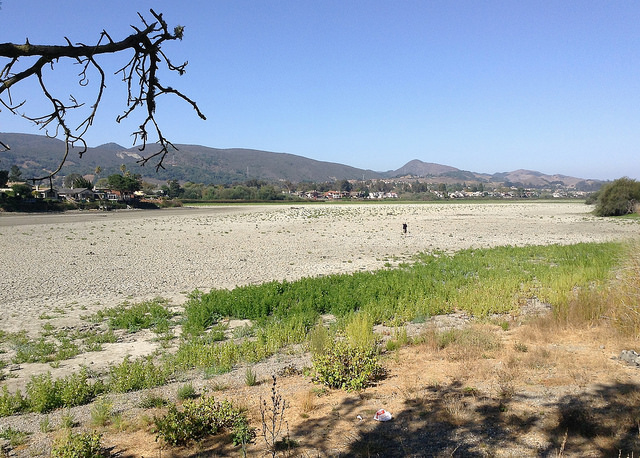The Los Angeles Times reports, “Gov. Jerry Brown [has] ordered cities and towns across California to cut water use by 25% as part of a sweeping set of mandatory drought restrictions, the first in state history. Emphasizing that the drought could persist, Brown said Californians must change their water habits.”
The news article highlights, “The order focused on urban life even though agriculture accounts for roughly three quarters of Californians’ water usage.”
In a media release, Council of Canadians chairperson (and Food & Water Watch chairperson) Maude Barlow says, “The drought crisis in California is not climate change per se, but the massive engineering of the state’s water supplies to provide for a handful of powerful farmers. A huge amount of the state’s water is exported as ‘virtual water’ embedded in export commodities.”
In her book Blue Future, Barlow further explains, “California exports large amounts of water-intensive hay and more than half its rice production — another water-intensive crop — to Japan. …In water-short California, some farmers are letting their fields lie fallow and are selling water as a cash crop to local municipalities. The state is now facing proposals to allow farmers to sell their water to developers, piping it long distances from its watershed. …Aside from the obvious concern about letting good farmland be taken out of production, the government has already subsidized most of these farmers for the water they now want to sell for profit.”
The Los Angeles Times article also notes, “Cities have to stop watering the median strips that run down the middle of roads. The state will partner with local agencies to remove 50 million square feet of grass — the equivalent of about 1,150 football fields — and replace it with drought-tolerant landscaping. State agencies will create a temporary rebate program to encourage homeowners to replace water-guzzling appliances with high-efficiency ones. Golf courses, campuses and cemeteries must cut their water use. New developments will have to install drip or microspray systems if they irrigate with drinking water. Water agencies will discourage water waste with higher rates and fees.”
And the newspaper reports, “Adam Scow, director of Food & Water Watch California, called the order disappointing. ‘The governor must save our groundwater from depletion by directing the state water board to protect groundwater as a public resource,’ Scow said in a statement.” Scow adds, “Governor Brown should direct the Water Board to place a moratorium on the use of groundwater for irrigating crops on toxic and dry soils on the westside of the San Joaquin Valley.” He also says, “It is disappointing that Governor Brown’s executive order to reduce California water use does not address the state’s most egregious corporate water abuses. In the midst of a severe drought, the Governor continues to allow corporate farms and oil interests to deplete and pollute our precious groundwater resources that are crucial for saving water.”
In October 2011, Governor Brown signed a series of bills that recognized drinking water as a basic human right. A previous Human Right to Water bill passed the California legislature in May 2009, but was later vetoed by then-Governor Arnold Schwarzenegger.
Photo: docentjoyce/flickr



